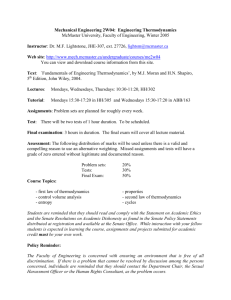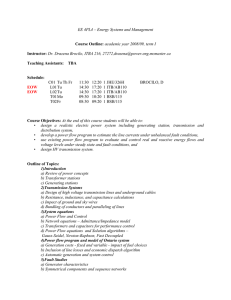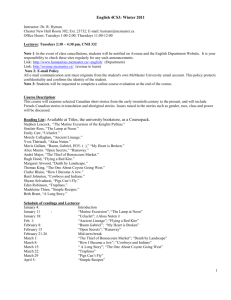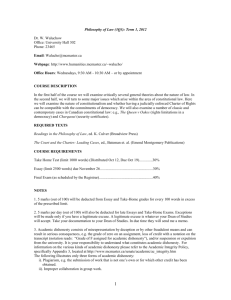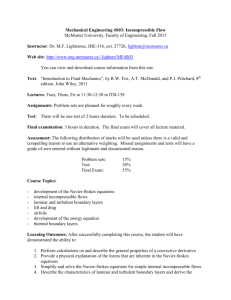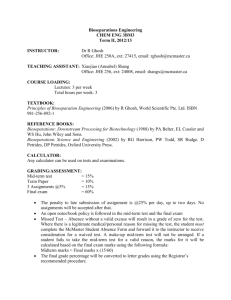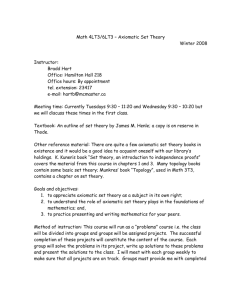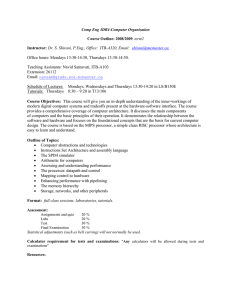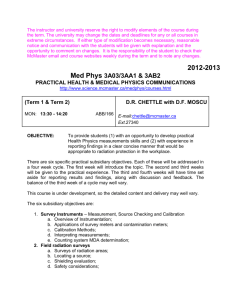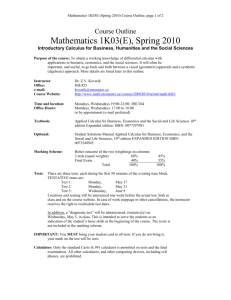EE_4PL4_Schofield_outline - Department of Electrical and
advertisement
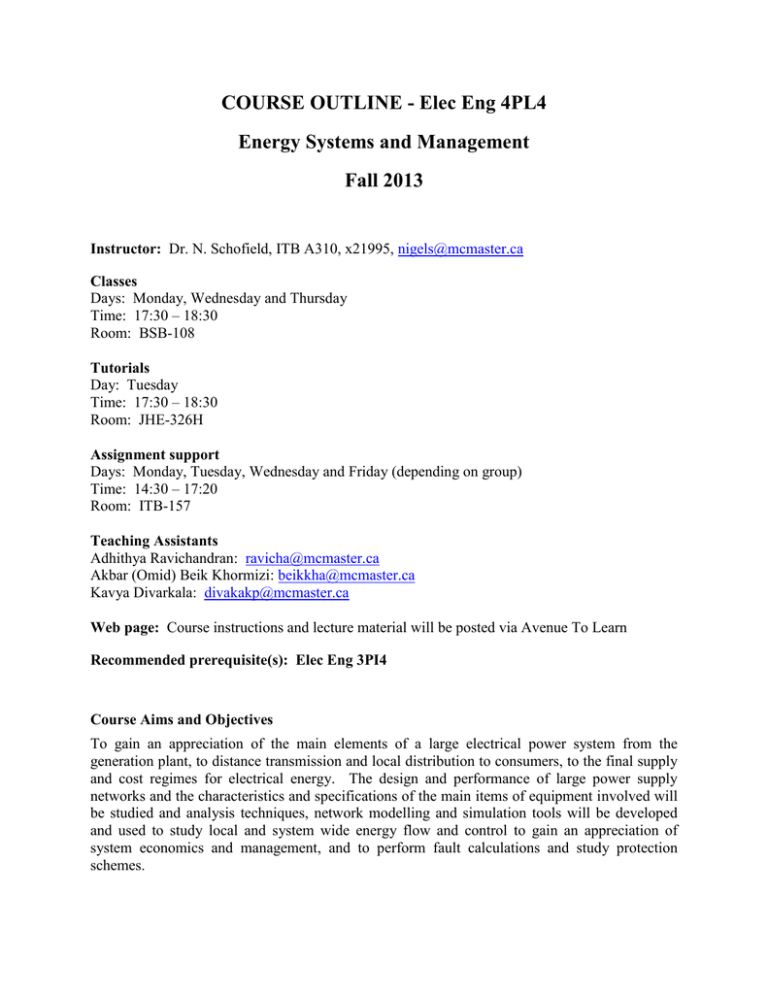
COURSE OUTLINE - Elec Eng 4PL4 Energy Systems and Management Fall 2013 Instructor: Dr. N. Schofield, ITB A310, x21995, nigels@mcmaster.ca Classes Days: Monday, Wednesday and Thursday Time: 17:30 – 18:30 Room: BSB-108 Tutorials Day: Tuesday Time: 17:30 – 18:30 Room: JHE-326H Assignment support Days: Monday, Tuesday, Wednesday and Friday (depending on group) Time: 14:30 – 17:20 Room: ITB-157 Teaching Assistants Adhithya Ravichandran: ravicha@mcmaster.ca Akbar (Omid) Beik Khormizi: beikkha@mcmaster.ca Kavya Divarkala: divakakp@mcmaster.ca Web page: Course instructions and lecture material will be posted via Avenue To Learn Recommended prerequisite(s): Elec Eng 3PI4 Course Aims and Objectives To gain an appreciation of the main elements of a large electrical power system from the generation plant, to distance transmission and local distribution to consumers, to the final supply and cost regimes for electrical energy. The design and performance of large power supply networks and the characteristics and specifications of the main items of equipment involved will be studied and analysis techniques, network modelling and simulation tools will be developed and used to study local and system wide energy flow and control to gain an appreciation of system economics and management, and to perform fault calculations and study protection schemes. Specific objectives will be to: have an understanding of the various conventional and renewable methods of power generation. use equivalent network models to calculate real power flow and understand the VAr demands on power system performance. analyse balanced and unbalanced three-phase, three and four wire networks. analyse the steady state behaviour of synchronous and induction generators and determine their main control features and performance characteristics when connected to large power networks. study the per-unit-system with regard to power system analysis and component specification, and calculating fault levels for balanced three-phase conditions. understand the construction and calculate the performance of three phase transformers and inductors in power systems. Outline Syllabus Power Systems: important operational features; 3-phase networks, balanced and unbalanced systems; power calculations; neutral-to-earth potential. Power Generation: different types of conventional power stations and related major plant; renewable sources; component characteristics; basic performance calculations. Synchronous and asynchronous (induction) generators: steady-state characteristics and operational performance; calculation of real and reactive power flows; regulation and system interaction; supporting plant and protections. Transformers: 3-phase power transformers; construction; insulation, thermal management and lifetime; protection; connection schemes; circuit models; performance; parallel operation and load sharing. Power Network: transmission lines and cables; voltage levels; bus-bar system concepts, infinite, PQ, PV and slack; system scheduling; system response; control of real and reactive power flow. Faults: fault current levels; per unit calculations; fault impedance; fault MVA; fault limiting; circuit breakers, protection devices and schemes. Format 3 lectures and 1 tutorial per week; 4 quizzes; 2 written assignments (North American grid network and modelling of power networks) and final end exam. Assessment Quiz solutions (4 x 5%) Assignments (2 x 20%) Final exam (3hours) 20% 40% 40% Calculators Only McMaster approved calculators can be used for tests and exams. Recommended Textbook Glover, J. D., Sarma, S. M. and Overbye, T. J.: “Power System Analysis and Design”, Cengage Learning, ISBN-10: 1-111-42577-9. Recommended Reading Guile, A.E. and Paterson, W.: “Electrical Power Systems”, Pergamon Press. Shepherd, J., Morton, A.H and Spense, L.F.: “Higher Electrical Engineering”, Pitman. Say, M.G.: “Alternating Current Machines”, Pitman. Weedy, B.M.: “Electric Power Systems”, 3rd edition Wiley. Grainger, J. J. and Stevenson W.D.: “Power Systems Analysis”, McGraw-Hill, ISBN: 0070612935. Harrison, J.A.: “An Introduction to Electric Power Systems”, Longman. Saadat, H.: “Power System Analysis”, McGraw-Hill. University Policy Reminders Senate and the Faculty of Engineering require all course outlines to include the following reminders: “The Faculty of Engineering is concerned with ensuring an environment that is free of all adverse discrimination. If there is a problem, that cannot be resolved by discussion among the persons concerned, individuals are reminded that they should contact the Department Chair, the Sexual Harassment Officer or the Human Rights Consultant, as soon as possible.” “Students are reminded that they should read and comply with the Statement on Academic Ethics and the Senate Resolutions on Academic Dishonesty as found in the Senate Policy Statements distributed at registration and available in the Senate Office.” “Academic dishonesty consists of misrepresentation by deception or by other fraudulent means and can result in serious consequences, e.g. the grade of zero on an assignment, loss of credit with a notation on the transcript (notation reads: ‘Grade of F assigned for academic dishonesty’), and/or suspension or expulsion from the university.” It is your responsibility to understand what constitutes academic dishonesty. For information on the various kinds of academic dishonesty please refer to the Academic Integrity Policy, specifically Appendix 3, located at: http://www.mcmaster.ca/senate/academic/ac_integrity.htm The following illustrates only three forms of academic dishonesty: 1. Plagiarism, e.g. the submission of work that is not one's own or for which other credit has been obtained. 2. Improper collaboration in group work (e.g., using laboratory reports previous years). 3. Copying or using unauthorized aids in tests and examinations. Both the owner of the work, if knowledgeable of the event, and the person copying the work will be reported to the University. For the first offence, the standard penalty is a zero on the work in question. Subsequent offences are much more serious: the student is typically assigned an F in the course, with a transcript notation indicating that the F is for academic dishonesty.
